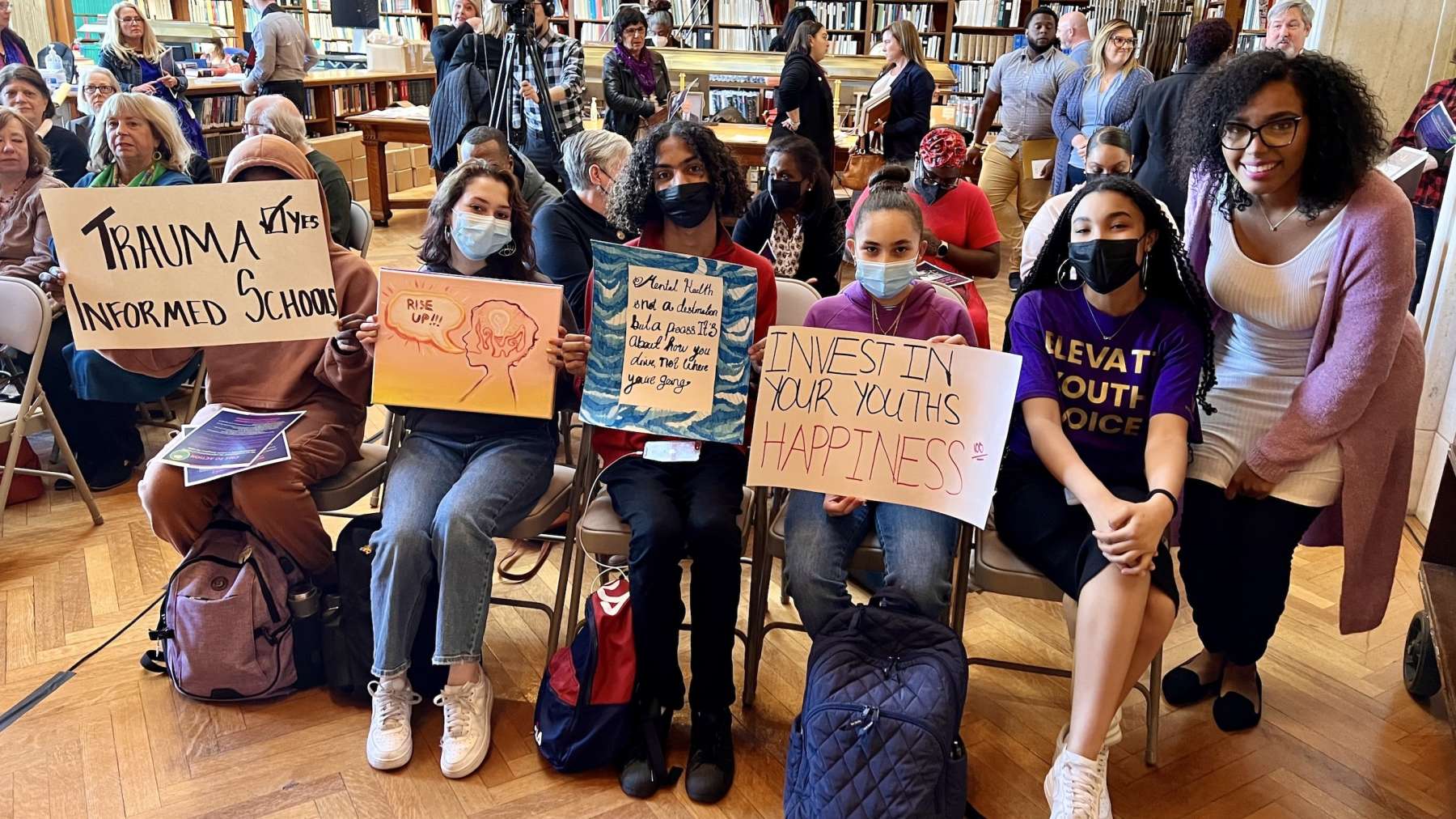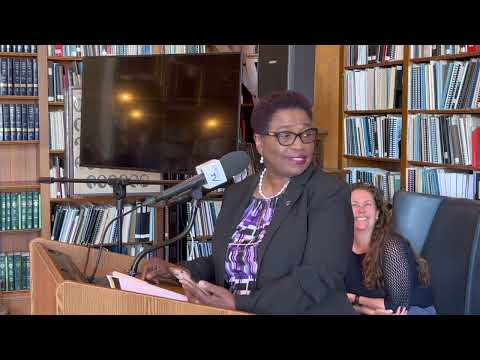The Trauma-Informed School Act prioritizes the mental health of our students
“I support this bill because I would like to see a more positive relationship between youth and adults in the classroom,” said high school student Paris Khule. “Teachers and counselors need to look beyond grades and recognize the underlying issues that might be affecting our mental health. If passed, this law would develop a stronger framework for discussing problems such as these, without fear of punishment or shame. I hope that the voices of students are heard and the Trauma Informed School Act becomes a reality. We are counting on our representatives to make the right decision.”
May 11, 2022, 11:01 am
By Steve Ahlquist
In the midst of what health care providers are call a “mental health state of emergency for Rhode Island children,” Rhode Island State Representative Marcia Ranglin-Vassell and Senator Sandra Cano are calling for the passage of their Trauma-Informed Schools Act to implement trauma-informed practices in schools throughout the state.
“I’m a 10th grade student in Rhode Island, as well as a member of Young Voices,” said Paris Khule, speaking about the importance of such legislation. “As the people and culture of Rhode Island changes, it’s important that our education remains culturally relevant and attentive to our needs. This means leaving behind a history of punitive discipline disciplinary measures and embracing modern evidence-based restorative practices that celebrates the diversity and rich cultural backgrounds of the student population during COVID. I know that me and many other students were struggling with mental health long before COVID. I was diagnosed with anxiety and I had been struggling with it for several years after my mother was hospitalized. In 2015, I was dealing with issues at home and during COVID I started feeling hopeless and losing motivation to do regular everyday things.
“It was hard for me to focus on schoolwork when the only things on my mind were way more important to me and emotionally taxing,” continued Khule. “Just getting up to go to school started feeling like such a mentally, physically, and emotionally tiring thing. I couldn’t do my work. I couldn’t get to school. It was a lot for me to answer a simple text. It was hard for me to explain these feelings to people around me, because it sounded like excuses to them, and sometimes I was told I was just being lazy. A lot of people around me, that were supposed to be there for me, were making me feel unsafe, like my issues weren’t real or important enough. A teacher pulled me aside after class one day and commented on the work I was missing. And it made me feel so bad. I didn’t even wanto to look her in the eye.
“I stayed out of school for several weeks because I was scared to go back and face my teachers after all the unfinished work and lack of showing up to school,” continued Khule. “I remember one day when I finally went back, I was having a panic attack and I reached out to one of my guidance counselors at my school in the hope for some sort of help. Instead, my guidance counselor immediately brought up my grades and started telling me about how bad they were and how I had missed a lot of school. I was struggling at the time with many things and needed support, but this one interaction made me feel bad enough that I didn’t want to reach out for help again. Dealing with COVID, mental health issues and not having a nurturing school environment that knew how to support me through this time was debilitating. Trauma feels like a persistent and recurring exposure to an unhealthy environment.
“I believe that the passage of the Trauma Informed Schools Act will help eliminate such needlessly harsh practices in the future and make a more restorative and healing school environment for everyone in Rhode Island,” concluded Khule. “Additionally, I support this bill because I would like to see a more positive relationship between youth and adults in the classroom. Teachers and counselors need to look beyond grades and recognize the underlying issues that might be affecting our mental health. If passed, this law would develop a stronger framework for discussing problems such as these, without fear of punishment or shame. I hope that the voices of students are heard and the Trauma Informed School Act becomes a reality. We are counting on our representatives to make the right decision.”
The Trauma Informed Schools Act (2022-H6667, 2022-S2556), which is scheduled for a vote before the House Education Committee today, would establish and implement trauma-informed practices within all elementary, middle and high schools. In a trauma-informed school, adults teaching or interacting with children are keenly aware of the implications of adverse childhood experiences and their implications to teaching and learning. They also reflect on their own teaching practices and use strategies that support students who may be experiencing.
“Each and every one of us experiences trauma at points in our life, some more than others, and the trauma we experience as children can shape our lives forever,” said Representative Ranglin-Vassell (Democrat, District 5, Providence), who works as a teacher at E-Cubed Academy in Providence. “The difference that determines whether we are able to be resilient and recover is whether we are supported by those in our community. In schools, teachers like myself see kids suffering every day from the trauma they have experienced, particularly during the pandemic the last couple of years. The mental-emotional needs of our children need to be met with care, and teachers and staff need resources to know how they can respond in ways that are helpful.”
Speaking of Representative Ranglin-Vassell, Representative Joseph McNamara (Democrat, District 19, Warwick), who chairs the House Education Committee, said, “No one has worked harder or understood at a greater level, the adverse impact of children facing trauma every day in our schools.”
“By passing the Trauma Informed Schools Act this session, we will help children and educators address the growing mental health concerns of children,” said Senator Cano (Democrat, District 8, Pawtucket). “We also believe this bill will help our educators who often struggle to meet the needs of these children. By supporting students’ needs around the issues of trauma, we will help them come to school better prepared to learn and by providing them with the opportunities they deserve to set them on the path for lifelong success.”
The bill aims to create school communities where all adults are prepared to recognize and respond to those who have been impacted by toxic stress and trauma. Students are provided with clear expectations and communication strategies to guide them through stressful situations. Trauma informed schools provide a safe, stable and supportive environment for students and staff and are welcoming and inclusive environments where all students can thrive.
“As a licensed mental health counselor, I have witnessed and helped treat the significant stress and trauma that is affecting our kids on a daily basis,” said Senator Alana DiMario (D-Dist. 36, Narragansett, North Kingstown). “The pandemic has only worsened the mental health of our students and appropriate steps and care are needed to ensure proper healing and growth. This is why I am proud to be a cosponsor of this important legislation, which will support and nurture the mental health of our students in their time of need.”
Last month, the Rhode Island chapter of the American Academy of Pediatrics and the Rhode Island Council of Child and Adolescent Psychiatry, alongside Hasbro Children’s Hospital and Bradley Hospital declared a mental health state of emergency for Rhode Island children, saying the “worsening crisis in child and adolescent mental health is inextricably tied to the stress brought on by COVID-19 and the ongoing struggle for racial justice and represents an acceleration of trends observed prior to 2020.”
“The isolation, loss and fear brought on by the pandemic have obviously taken their toll on kids, many of whom were already experiencing other traumas and mental health challenges,” said Representative Teresa Tanzi (Democrat, District 34, South Kingstown Narragansett). “It is very clear that we are only beginning to come to terms with the shadow pandemic of serious and widespread behavioral health challenges. We need to respond to it intentionally, and implementing trauma-informed practices at school is an important part of that response.”
“In order to aid children in their growth as leaders and inclusive members of society, we must provide a safe space to nurture mental health and overcome traumatic experiences and learning challenges,” said parent and community advocate Naiommy Barret. “Our children are in school eight hours a day, five days a week. School communities need to ensure culturally responsive, integrative and positive school based mental health and trauma-informed approaches.”
“The pandemic has magnified the need for all professionals who serve children, to support the whole child,” said Darlene Allen of Adoption Rhode Island, who emceed the event. “Childhood adversity is more prevalent than many are aware of, impacting children across our state and from every ZIP code. Understanding adverse childhood experiences will help educators and others to promote a more successful learning environment for all children.”

The legislation is supported by the Rhode Island Department of Education, Rhode Island Kids Count, Rhode Island Developmental Disabilities Council, Mental Health Association of Rhode Island, Adoption Rhode Island, United Way of Rhode Island, State Treasurer Seth Magaziner, the American Civil Liberties Union Rhode Island, the City of Providence Health Communities Office, Rhode Island Chapter of Moms Demand Action for Gun Sense In America, Rhode Island Federation of Teachers and Health Professionals, Providence Teachers Union, National Education Association, Rhode Island Black Business Association, and Comprehensive Community Action Program. Parents, doctors and psychologists testified in favor of it in committee hearings.














